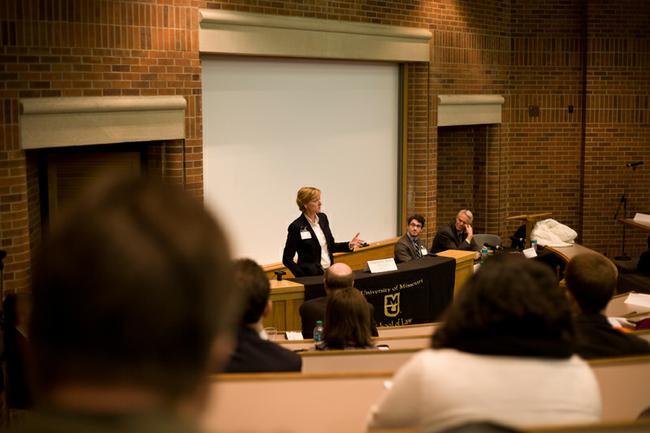This year’s Law Review Symposium aims to tackle issues of cyberbullying, as well as address the effect and possible legal remedies.
The symposium is an annual conference sponsored by the Missouri Law Review. Each year’s topic is chosen by the faculty co-chairs and can range from court of appeals to judicial selection and retention plans to cyberbullying.
This year’s faculty co-chairs were professors Douglas Abrams and Christina Wells.
“We chose cyberbullying because it is one of the most pressing issues in the public schools today,” Abrams said.
The co-chairs worked closely with the Law Review staff and students.
The co-chairs worked to choose and gather the three panels that spoke and debated during the two-day symposium. Panel One spoke Thursday afternoon, and Panels Two and Three spoke Friday morning.
The three panels were Constitutional/Legal Implications of Regulating Cyberbullying, Psychology and Emotion: Effects of Cyberbullying and Challenges in Schools: Effective Implementation.
“Panel One consisted of three smart, thoughtful people with excellent ideas to energize the audience,” Abrams said. “It was a very good panel.”
The panels were constructed almost entirely of faculty members from different universities across the nation.
“Both professor Wells and I teach constitutional law, so we know who the experts in the field are,” Abrams said.
UM-Kansas City professor Daniel Weddle was one of the speakers in Panel Three. The third panel focused on effective implementation.
“The main thing I want to talk about is legal incentives and legal obstacles to effective bullying prevention,” Weddle said. “We have known how to effectively reduce bullying for a long time, but the law does not require the right things. It often requires things that make it more difficult. Some states even create disincentives to stop bullying. Well-meaning legislators make it less likely that bullying will be addressed correctly.”
The keynote speaker for this year’s symposium was John Palfrey, a professor of law at Harvard University. Palfrey has studied the effect of the Internet on society for a decade. Palfrey became ill and was unable to make it to Columbia to give his speech in person, so the speech was given via Skype.
“Cyberbullying is both newfangled and old school,” Palfrey said during his speech. “The act of bullying itself is not new by any means, but the way that it is carried out is the new aspect.”
Palfrey’s speech went on to cover topics such as what children are doing right online, peer-to-peer harm, defining bullying, state and federal legislature, criminalization of bullying and responses to consider.
“We need an interdisciplinary approach — social scientists, educators, doctors, lawyers,” Palfrey said. “I believe in a holistic approach: schools, parenting, mentorship, social workers and law enforcement. We must work through the community.”
Palfrey and his co-workers at the Berkman Center for Internet and Society have recently partnered with Lady Gaga and her mother’s Born This Way Foundation.
“It is a great opportunity to reach a large number of people with a single tweet or Facebook message,” said Palfrey.
The foundation holds its launch event Feb. 29 on Harvard’s campus.
MU Law School Dean Lawrence Dessem said he saw many positive effects of the annual symposium.
“Students who come to the symposium get to meet speakers from all over the country,” Dessem said. “It’s really a stellar group of experts from all over the country. There are members of the community here as well. It’s a good way to bring people together to talk about an important subject.”








